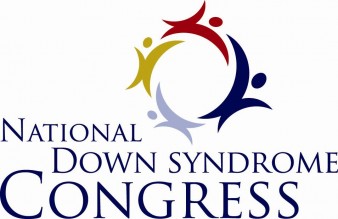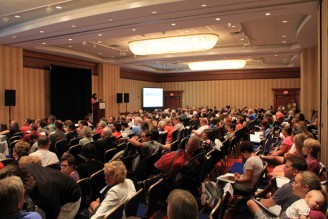Global Down Syndrome Educational Grants Announced on International Day of Persons with Disabilities
December 3rd, 2013 by Global Down Syndrome Foundation


Medical professionals, self-advocates and parents of people with Down syndrome will have access to 14 innovative educational programs across the U.S. and Puerto Rico through $155,000 in Global Down Syndrome Educational Grants.
This year’s grants, varying from $6,000 to $10,000 and benefiting eight local Down syndrome organizations, are being announced on International Day of Persons with Disabilities. In 2012, six organizations received grants from the program, which is a collaboration between the Global Down Syndrome Foundation (“Global”) and the National Down Syndrome Congress (“NDSC”).
“We are so pleased to be able to help local Down syndrome organizations and build capacity in our community,” said Michelle Sie Whitten, executive director of Global. “These organizations have great ideas that truly provide value to people with Down syndrome. They just need some encouragement and funds in order to deliver.”
Grant recipients detailed their ideas, budgets and goals for educational programs as part of their applications, which were reviewed by Global and NDSC for thoroughness, potential and sustainability. More than 50 applications have been submitted through the program.
The 2013 grant recipients are: Down Country, Down Syndrome Association of Brazos Valley, Down Syndrome Association of Central Florida, Down Syndrome Association of Central Oklahoma, Down Syndrome Association of Greater Richmond, Down Syndrome Association of Memphis & the Mid-South, Puerto Rico Down Syndrome Foundation and Red River Valley Down Syndrome Society.
Down Syndrome Groups Concerned by Reports of Jailed Pakistani Girl
August 21st, 2012 by Global Down Syndrome Foundation
The Global Down Syndrome Foundation, the National Down Syndrome Congress, the National Down Syndrome Society, Down Syndrome Education International and the International Down Syndrome Coalition have joined together in shared concern over the fate of Rifta Masih, a young Pakistani girl reported to have Down syndrome who allegedly was jailed and faces life-threatening implications.
People with Down syndrome and other intellectual disabilities are a vulnerable population. Although early intervention and inclusion in some nations has meant great gains for many, there are still people with intellectual disabilities who have difficulty processing information or fully understanding the consequences of their actions.
We hope and expect that people from all countries and cultures, including those in the United States, will take this into account in terms of how people with Down syndrome and other intellectual disabilities are handled in police- and security-related matters. We strongly encourage the Pakistani police to ensure the young girl’s safety and to allow family members and others who are known and trusted by the girl to stay with her to the extent that detention is necessary for her own protection.
It is very difficult for most people with intellectual disabilities to be taken out of their routine, and sometimes this may trigger agitated and uncontrollable behavior. We hope that this young girl will be able to return to the routine where she is safe and happy. We join others in urging restraint and compassion in this situation.
Teaching Motor Skills to Children Translates Across Languages
August 3rd, 2012 by Global Down Syndrome Foundation
 Parents struggling with how to help their kids with Down syndrome learn to walk, balance, run and climb are getting help from a recent workshop that’s being touted in multiple languages.
Parents struggling with how to help their kids with Down syndrome learn to walk, balance, run and climb are getting help from a recent workshop that’s being touted in multiple languages.
Pat Winders, senior physical therapist at the Anna and John J. Sie Center for Down Syndrome at Children’s Hospital Colorado, led sessions on “Gross Motor Development in Children with DS” at the National Down Syndrome Congress’ national convention in Washington, D.C. One of the people in attendance was Ana Virginia Garroni, the mother of 3-year-old Otto and the author of a popular South American blog, “El Mundo de Otto,” or “The World of Otto.”
The workshop was offered with simultaneous interpretation, and now Garroni is helping spread the word in Spanish of best care practices and intervention strategies back home in Venezuela.
“Children with Down syndrome want to do what all children want to do,” Winders says on her biography at the Crnic Institute. “They want to learn to sit, crawl, walk, explore the environment, and interact with the people around them.”
Since joining the Sie Center in December of 2007, Winders has seen nearly 250 patients and has launched several programs with the Global Down Syndrome Foundation, including the Be Beautiful Be Yourself Dance Class with the Colorado Ballet and the Ed McCaffrey Dare to Play Football and Cheer Camps. Her position at the Sie Center has allowed her to mentor other physical therapists, participate in important gross motor skills research, and update the definitive book that she researched and wrote — Gross Motor Skills in Children with Down Syndrome: A Guide for Parents and Professionals.
The Sie Center for Down Syndrome is part of the Linda Crnic Institute for Down Syndrome at the Anschutz Medical Campus in Aurora, Colorado.
One Day on the Hill, Hundreds of Voices for Change
July 31st, 2012 by Global Down Syndrome Foundation

The Down Syndrome Day on the Hill brought 500 advocates to the U.S. Capitol.
The Global Down Syndrome Foundation and the National Down Syndrome Congress organized 500 concerned citizens, including 176 self-advocates, who brought influential and inspirational voices to the steps of the U.S. Capitol on July 19 for the Down Syndrome Day on the Hill.
The Down Syndrome Day on the Hill is the single-largest group of self-advocates and their families ever to push for legislation benefiting people with Down syndrome.
The event gave participants a voice in influencing public policy through more than 100 direct meetings with senators and representatives.
Day on the Hill participants were trained the night before the event on the best ways to advocate for government action in four areas (Click here to see the presentation):

Global Down Syndrome Foundation Executive Director Michelle Sie Whitten leads a training session for advocates before the Down Syndrome Day on the Hill.
1. Ensuring greater parity in Down syndrome research and development by urging legislators to co-sponsor the Trisomy 21 Research Centers of Excellence Act (HR 2695/S 1840) and the Trisomy 21 Research Resource Act (HR 2696/S 1841) and urging increased funding for Down syndrome research at the National Institutes of Health. Down syndrome is the least funded genetic condition by the NIH, despite being the most frequent chromosomal disorder.
2. Ensuring access to a safe, healthy environment in schools by reducing the use of restraints and seclusions by calling on lawmakers to co-sponsor the Keeping All Students Safe Act (HR 1381/S 2020).
3. Protecting against continued cuts in Medicaid and other entitlement programs, and considering legislation to aid the transition of youths with significant disabilities into adulthood. Advocates pressed lawmakers on the Transition Toward Excellence, Achievement and Mobility legislation in the House (HR 602 and HR 603) and the introduction of similar bills in the Senate.
4. Supporting legislation to improve the economic advancement of people with Down syndrome and their families through the Achieving a Better Life Experience (ABLE) Act (HR 3423/S 1872).
Our friends and co-organizers at the National Down Syndrome Congress, who were holding their 40th annual convention that weekend in Washington, have posted some great photos of the Down Syndrome Day on the Hill on their Facebook page. Click here to see some of the activities.
The Global Down Syndrome Foundation would like to thank Soapbox Consulting for its fabulous job in helping coordinate the Day on the Hill congressional meetings.
For more information on how to contact your representative, access the Global Down Syndrome Foundation’s advocacy toolkit.

 Experience our inspirational and groundbreaking videos and photos. Our children and self-advocates are beautiful AND brilliant!
Experience our inspirational and groundbreaking videos and photos. Our children and self-advocates are beautiful AND brilliant! Make sure your local Representatives are on the Congressional Down Syndrome Task Force.
Make sure your local Representatives are on the Congressional Down Syndrome Task Force.